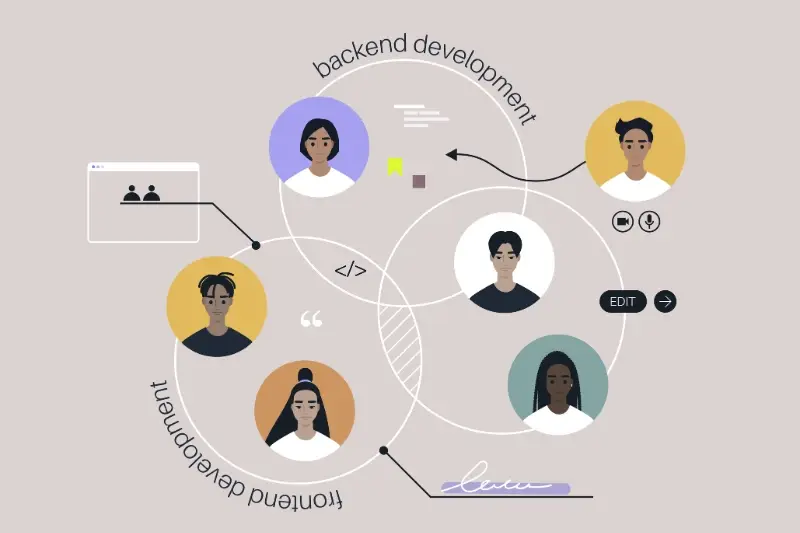Building a Sustainable Development Culture in Startup Teams
Nine out of ten startups fail within their first year, and poor team dynamics rank among the top reasons why. It's a sobering statistic that highlights just how critical getting your development culture right can be. I've worked with dozens of startup teams over the years, and I can tell you that the ones who succeed aren't always the smartest or most well-funded—they're the ones who build strong, sustainable ways of working together.
Building a sustainable development culture isn't just about having the right processes in place; it's about creating an environment where your team can thrive even when things get tough. And let's be honest, in startup life, things get tough quite often! Your development culture becomes the foundation that holds everything together when deadlines are looming, budgets are tight, and the pressure is on.
A sustainable development culture is what separates teams that burn out from teams that scale up
The good news is that creating this kind of culture doesn't require expensive tools or complex frameworks. It's built on simple principles like trust, clear communication, and smart processes that actually work for small teams. Throughout this post, we'll explore practical strategies that you can implement right away to transform how your startup team works together and builds better products.
What makes a development culture sustainable
After working with dozens of startup teams over the years, I've noticed that the ones who last—and I mean really last—share some common traits. They don't just focus on shipping features quickly; they build practices that keep their team healthy and productive for months and years to come. This isn't about being perfect from day one, but about creating an environment where people can do their best work without burning out.
Core elements of lasting development culture
Sustainable development culture starts with respect for both the code and the people writing it. Teams that survive the startup grind understand that cutting corners today often means paying double tomorrow. They invest time in writing clean code, documenting their decisions, and setting up processes that scale with their growth.
The most successful teams I've worked with share these characteristics:
- They prioritise learning over being right all the time
- Mistakes are treated as learning opportunities, not blame sessions
- Everyone feels comfortable asking questions and sharing ideas
- Technical decisions are made collectively, not dictated from above
- Work-life balance is protected, even during crunch periods
Building for the long term
What separates sustainable teams from those that flame out? They think beyond the next sprint. They invest in automation, testing, and code reviews—not because they're perfectionist, but because they know these practices save time and stress later. Most importantly, they celebrate small wins and learn from setbacks without letting either go to their heads.
Building trust within your startup team
Trust isn't something you can just declare exists in your team—it's earned through small, consistent actions over time. I've worked with countless startup teams over the years, and the ones that build sustainable development culture all share one common trait: they've mastered the art of psychological safety. When developers feel safe to admit mistakes, ask questions, and share half-formed ideas, that's when real innovation happens.
The foundation of team trust starts with transparency around decision-making. Your team needs to understand not just what they're building, but why certain technical choices were made. When a senior developer decides to refactor a component or choose one framework over another, explaining the reasoning builds confidence in the team's direction.
Daily practices that build trust
- Share failures openly during retrospectives
- Give credit publicly and provide feedback privately
- Admit when you don't know something
- Follow through on commitments consistently
- Include junior developers in technical discussions
Trust also means being honest about project timelines and technical debt. When deadlines are unrealistic, say so. When code quality is suffering, address it head-on rather than hoping it'll sort itself out later.
Start each week with a quick team check-in where everyone shares one thing they're excited about and one thing they're concerned about—this simple practice builds empathy and prevents problems from festering.
Setting up effective development processes
Right, let's talk about development processes—something that can make or break your startup team. I've watched countless teams struggle because they either had no process at all or went overboard with complicated systems that slowed everyone down. The trick is finding that sweet spot where your team can move fast without breaking everything.
When you're starting out, you don't need heavyweight processes. You need something lightweight that grows with your team. Start with the basics: version control (Git is your friend here), code reviews, and a simple way to track what everyone's working on. These three things alone will save you from most disasters.
Core processes every startup team needs
- Version control with clear branching strategy
- Code review process (even if it's just one other person looking)
- Issue tracking system to manage bugs and features
- Deployment process that doesn't involve crossing fingers
- Regular team check-ins to spot problems early
The key thing I've learned is that processes should feel helpful, not like bureaucracy. If your team starts groaning about following a process, you've probably made it too complicated. Keep tweaking until it feels natural—your future self will thank you when you're not scrambling to fix broken deployments at midnight.
Making agile methodology work for small teams
I'll be honest—when most people hear "agile methodology" they think of big corporate teams with daily standups and sprint planning meetings that seem to go on forever. But here's the thing: agile development processes can actually work brilliantly for small startup teams, you just need to adapt them properly.
The beauty of agile methodology in small teams is that you can strip away all the bureaucracy and focus on what really matters. Instead of formal ceremonies, you might have quick morning chats over coffee. Rather than detailed user stories, you could use simple task boards that everyone can see and update. The key is keeping the core principles—regular feedback, short development cycles, and team collaboration—while ditching the corporate overhead.
Adapting sprints for startup speed
Small teams move fast, so your sprints should too. We've found that one-week sprints often work better than the traditional two-week cycles. This gives you more opportunities to pivot quickly when priorities change, which they will in a startup environment.
The best agile process is the one your team actually follows, not the one that looks perfect on paper
Don't get caught up in doing agile "perfectly"—focus on what helps your team deliver better software faster. If daily standups feel like overkill, try every other day. If retrospectives aren't adding value, make them shorter or less frequent. Your development culture should serve your team, not the other way around.
Creating clear communication channels
Communication breakdowns kill more startup projects than bad code ever will—trust me on this one. I've watched brilliant teams fall apart because nobody knew what anyone else was working on. The good news? Setting up proper communication channels isn't rocket science, but it does require some thought.
Start with the basics: pick one primary tool for team chat and stick with it. Whether that's Slack, Microsoft Teams, or even Discord, consistency matters more than features. Create dedicated channels for different topics—general chat, bug reports, deployment updates. This stops important messages getting lost in a sea of random conversations.
Daily communication rhythm
Your team needs a predictable communication rhythm. Daily standups work brilliantly for this—just keep them short and focused. Each person shares what they did yesterday, what they're doing today, and any blockers they're facing. That's it.
Documentation that actually gets used
Written communication is just as important as verbal. Keep a shared document or wiki where decisions get recorded. Not everything—just the big stuff that affects how you build things. Here's what should always be documented:
- Architecture decisions and why they were made
- API documentation and examples
- Deployment procedures and access details
- Coding standards your team follows
- Common bugs and their solutions
The key is making documentation feel natural, not like homework. When someone asks a question that's been answered before, update the docs rather than just answering again.
Managing technical debt and code quality
Technical debt is like borrowed money—it feels great at first but comes back to bite you later. I've seen countless startup teams rush to get features out the door, cutting corners on code quality because they think they can fix it later. Spoiler alert: later never comes, and the debt keeps growing until your development processes grind to a halt.
The key to managing technical debt in your development culture isn't avoiding it completely (that's impossible in startups), but being smart about when you take it on. Every shortcut should be a conscious decision, not an accident. Your team needs to understand that quick fixes today mean slower development tomorrow.
Building quality into your development processes
Code reviews aren't just about catching bugs—they're about sharing knowledge and maintaining standards across your team. When everyone on your team understands the codebase, you build resilience into your development culture. No single person becomes a bottleneck, and team collaboration improves naturally.
Schedule regular "tech debt days" where your team can tackle accumulated issues. This prevents small problems from becoming big ones and keeps your development velocity consistent.
Here's what every startup team should track:
- Code review completion rates
- Bug resolution time
- Test coverage percentage
- Time spent on maintenance vs new features
- Team satisfaction with code quality
Remember, sustainable development culture means your team can move fast without breaking everything. Quality isn't the enemy of speed—it's what enables long-term velocity in your agile methodology.
Measuring team health and continuous improvement
I'll be honest with you—measuring team health isn't something most startup founders think about until problems start showing up. But by then, you're already playing catch-up. After working with countless development teams over the years, I've learnt that the best teams are the ones that actively track how they're doing and make small adjustments along the way.
The trick is keeping it simple. You don't need fancy dashboards or expensive tools to understand how your team is performing. Start with these basic health indicators that actually matter:
- How often team members speak up in meetings
- Whether people are staying late regularly (that's usually a warning sign)
- How quickly bugs get fixed after they're reported
- If the same person always volunteers for difficult tasks
- Whether code reviews happen consistently
Making improvements that stick
Here's what I've noticed works best: pick one thing to improve each month. Maybe it's reducing the time spent in meetings, or making sure everyone gets to work on interesting features—not just the senior developers. The key is getting the whole team involved in deciding what to change.
Regular retrospectives don't have to be formal affairs. Sometimes the best insights come from casual conversations over coffee. What matters is that you're constantly asking: "How can we do this better?" and actually acting on the answers.
Conclusion
Building a sustainable development culture isn't something that happens overnight—it's a gradual process that requires patience, commitment, and the willingness to make mistakes along the way. From my experience working with startup teams over the years, I've seen that the ones who succeed are those who understand that culture isn't just about having the right processes in place; it's about creating an environment where people actually want to work together.
The teams that thrive are the ones who've mastered the basics: they communicate openly, they trust each other to do good work, and they've built development processes that support their goals rather than getting in the way. They understand that agile methodology isn't about following a rigid framework—it's about adapting and improving as they go. These teams also know that managing technical debt and measuring team health aren't just nice-to-haves; they're the foundation of long-term success.
What I find most rewarding is watching startup teams transform from chaotic groups of individuals into cohesive units that can tackle complex problems together. The difference between a team with strong development culture and one without is like night and day. When you get it right, everything else becomes so much easier—and your product inevitably gets better too.
Share this
Subscribe To Our Blog
You May Also Like
These Related Stories

The Honest Truth About Remote App Development Teams

Enterprise App Development: What Every Business Leader Needs to Know





